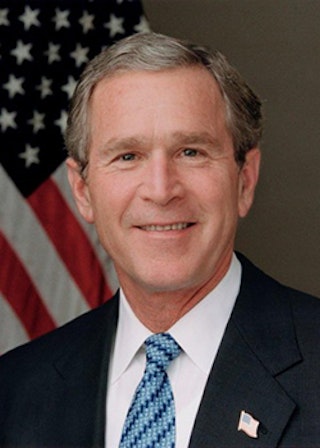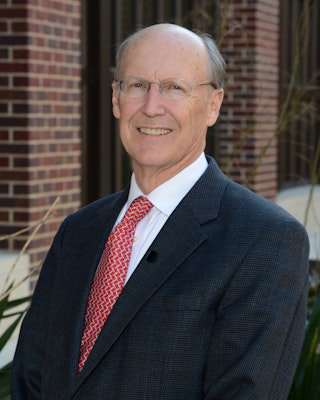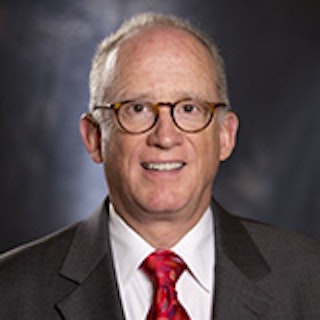Views on North America from the Governor's Mansion to the White House
Growing up in Texas and then becoming its governor before being elected the 43rd President of the U.S., George W. Bush has spent his life in the center of North America. He reflects on his personal relationships and those of the U.S. with our North American neighbors.
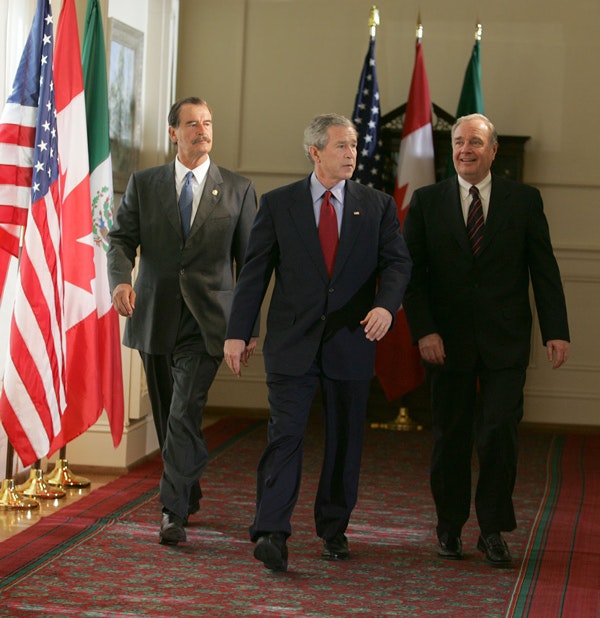 President George W. Bush walks with Mexico President Vicente Fox, left, and Canadian Prime Minister Paul Martin upon their arrival Wednesday, March 23, 2005, at the Bill Daniels Activity Center at Baylor University in Waco, Texas. (Eric Draper / George W. Bush Presidential Library and Museum/NARA)
President George W. Bush walks with Mexico President Vicente Fox, left, and Canadian Prime Minister Paul Martin upon their arrival Wednesday, March 23, 2005, at the Bill Daniels Activity Center at Baylor University in Waco, Texas. (Eric Draper / George W. Bush Presidential Library and Museum/NARA)
The Catalyst asked President George W. Bush to discuss North America, including the way he first developed an understanding of Mexico. Catalyst Editor William McKenzie and Catalyst Editorial Board Member Matthew Rooney, the Bush Institute’s Economic Growth Director, interviewed the President in his office at the Bush Center.
How did you stay in touch with Mexico as governor? How did that inform your leadership of Texas?
As governor of Texas, a key part of the state, of course, is the border. As a kid I used go down there and it was impoverished. But trade with Mexico began to create a vibrant middle class on both sides of the border. It became very evident when you campaigned there.
Secondly, I went to a lot of parades. They are multicultural – or bi-cultural. I will never forget going down to the Laredo Parade. I think it was George Washington’s birthday. It reminded me of being in a Fourth of July parade in 1978 in Muleshoe, Texas. There wasn’t a lot of positive response. I went down later and the response was much better.
The people realized that my type of politics was not one of exclusion but inclusion, starting with naming a lot of Latinos to positions of importance. It was a conscious effort to send the signal that the Bush Administration, at least from the governor’s perspective, was going to include a lot of Mexican-Americans.
A key part of the state, of course, is the border. As a kid I used go down there and it was impoverished. But trade with Mexico began to create a vibrant middle class on both sides of the border. It became very evident when you campaigned there.
You participated in meetings of border governors…
I took them very seriously. I would go to them, and I found them to be fun. There is nothing like sharing time with somebody who, in some ways, is going through the same things you are going through.
 Texas Governor George W. Bush and Governor Fernando De Jesus Canales Clariond (C) of Nuevo Leon, Mexico attend a joint work session for U.S. and United Mexican States governors as part of the 18th annual Border Governors Conference in Sacramento, California on June 2, 2000. (Monca M. Davey/AFP/Getty Images)
Texas Governor George W. Bush and Governor Fernando De Jesus Canales Clariond (C) of Nuevo Leon, Mexico attend a joint work session for U.S. and United Mexican States governors as part of the 18th annual Border Governors Conference in Sacramento, California on June 2, 2000. (Monca M. Davey/AFP/Getty Images)
This was before the border angst and high drama of the border issue. It was fun to get to know these men. Some of these border governor conferences took on great theater.
One time there was a death penalty case with a Mexican national, and a governor made a dramatic scene. He presented me with a petition or something, very well-timed and very dramatic. I took it all in because he had his politics and I knew that and understood that.
I never took great umbrage with some theatrics of Mexican political leaders. The reason is I know how important the border region is to our state. The idea of having a vibrant region benefits the whole state.
How did you first develop an interest in Mexico? Did that come from growing up in Midland or Houston?
My first real consciousness of Mexico came when I opened the door in 1959 and there was a Mexican woman, Paula Rendón, standing on the steps of our Houston home, frightened about her future, nervous. But she was welcomed into our family and still is in our family.
She was my first real exposure to Mexican culture and the positive features of the Mexican populace. There was some exposure in West Texas to Latinos, including playing Little League baseball. But there wasn’t a lot of interaction. So it was really in Houston that I began to get a sense for the beauty of the culture and the unbelievably hard working nature of someone who escaped poverty to improve the life of her children. She had three children, one of whom joined the Marines.
It was really in Houston that I began to get a sense for the beauty of the culture and the unbelievably hard working nature of someone who escaped poverty to improve the life of her children.
So she worked with you all for a long time?
She lived with us for a period of time and then eventually bought her own home. We were living with someone seeking the American experience. My awareness was increased a lot because of her. I was 13 years old and it was a good educational experience. Then I started studying the language.
When I ran for Congress in West Texas in 1978, there wasn’t a big Latino population out there. There is now, but there wasn’t then. Cultural immersion took place later when I ran for governor.
 Presidents Fox and Bush toast each other at the State Dinner Wednesday evening at the White House. (Eric Draper / George W. Bush Library and Museum/NARA)
Presidents Fox and Bush toast each other at the State Dinner Wednesday evening at the White House. (Eric Draper / George W. Bush Library and Museum/NARA)
Your first State Dinner was for the president of Mexico and early in your administration you went to the State Department to meet with Foreign Service Officers about Mexico. How did North American relationships inform your leadership of the United States? How did they facilitate – or get in the way of – your leadership?
First of all, the reason those relationships are important is that I wanted to signal that our neighbors are important. We have a lot of common opportunities, and we have some problems to deal with. There is no better way to solve problems than to have positive relations with your neighbors.
The reason those relationships are important is that I wanted to signal that our neighbors are important. … There is no better way to solve problems than to have positive relations with your neighbors.
The first trip was to see Vicente Fox in León, Guanajuato. I will never forget driving back from his finca and seeing Air Force One. It was like it was sitting on this horizon line and was this majestic site. But like all presidential visits, they can be easily disrupted by external events. I stood to give my press conference about how important Mexican relations are and the Mexican press, which is pretty aggressive — which is good — said in essence, “How dare you bomb Iraq while you’re visiting Mexico?”
I didn’t know what they were talking about. As it turned out, we ran a sortie enforcing the no-fly zones in Iraq. I didn’t know about it, but the Mexican press took it on as a key issue and so the whole message got obscured.
The first crisis we dealt with in Canada was with potatoes, which morphed into timber. But relations were personal enough that these issues were not able to cloud the unified vision.
Obviously, the Iraq theater of the larger ideological conflict created political difficulties for the Canadian and Mexican leaders. I understood that. I worked hard to make sure that that external event did not disrupt what we were trying to achieve, which was dealing with regulations that would hamper trade.
I tried to send signals to the Mexicans and Canadians. For example, there was the issue of Mexican trucking. This was a very controversial issue. My view was, if the trucks can pass inspection and they are moving goods that are important for America, they should be allowed to move. The Teamsters weighed in and made it difficult to implement.
You fixed trucking but in the meantime softwood lumber from Canada is still with us.
Yeah, it’s a difficult issue. I remember asking both the Canadian Prime Minister and our negotiators, were we making any progress and what were the difficulties? I don’t know where the issue now stands, but I know it is a touchy issue.
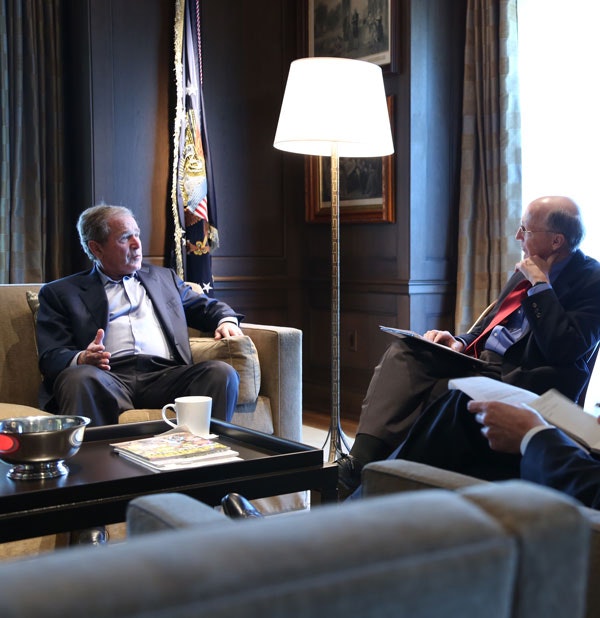 President George W. Bush with William McKenzie and Matthew Rooney (not pictured) discussing North America at the Bush Center. (Andrew Kaufmann / George W. Bush Presidential Center)
President George W. Bush with William McKenzie and Matthew Rooney (not pictured) discussing North America at the Bush Center. (Andrew Kaufmann / George W. Bush Presidential Center)
Do national interests always trump relationships or do relationships make it easier to deal with divergent interests?
Relationships make it easier to deal with divergent interests. A relationship is one where you’re willing to listen to what the other person says and understand the pressures that one has to deal with. Democracies are somewhat predictable in that the people tend to express their interests loudly, and political figures tend to respond to those interests. It’s important for leaders to be open-minded and understanding about how the other person thinks and the pressures on the other person.
Relationships make it easier to deal with divergent interests. A relationship is one where you’re willing to listen to what the other person says and understand the pressures that one has to deal with.
Along the same lines, relationships between countries go through different phases.
Correct.
That includes here in North America. How do leaders allow those differences to take place and let relationships change, yet keep moving them towards a common goal?
There has to be a strategic goal defined early, and that is we all benefit when we work together. You cannot let the difficulties, like water, undermine the benefits for all the people.
A strategic thinker is one that says, “we can all do well.” A non-strategic thinker says that, “one of us has to win; one of us has to lose.”
A strategic thinker is one that says, “we can all do well.” A non-strategic thinker says that, “one of us has to win; one of us has to lose.”
I tried to be the former and say that we’ve got problems, but we can work through them. We set up a North American council to have the leaders come together as a way to signal that the good outweighs the difficulty if we can work together.
What is the major obstacle that stands in the way of North America realizing its potential? How do the three governments best come together to overcome that obstacle?
The major obstacle is a populist dream, primarily in the United States, that in essence says the common good, by working together, does not overcome the problems. “It’s not worth it.”
That causes backlashes, primarily in Mexico, with people there basically saying they don’t like us. U.S.-Canadian relations are sometimes defined by other issues. But both sets of concerns are undermined by an isolationist attitude that says we can’t benefit when we work together.
How do we change that?
One thing is, we’ve got to talk about the benefits in a positive way. When we work together and solve common problems, our peoples all benefit.
Immigration has obviously complicated the issue, more so in the southern part of our relationship than with Canada. There’s an attitude amongst some that we just shut down immigration. That is impossible to do.
What we need to be doing is explaining the benefits of a rational immigration policy, and one of those benefits is economics. There are people willing to do jobs that Americans aren’t willing to do, and it benefits our economy.
There are many mothers and fathers who want to improve the lives of their children, no matter where they live. Yet the influx of people from elsewhere has created some cultural clashes, some nervousness about culture. That leads to fear, and sometimes that fear can be exploited. It is important to have somebody propose solutions that address people’s fears as opposed to heightening those fears.
There are many mothers and fathers who want to improve the lives of their children, no matter where they live. Yet the influx of people from elsewhere has created some cultural clashes, some nervousness about culture. … It is important to have somebody propose solutions that address people’s fears as opposed to heightening those fears.
Turning a moment to security, what would be your vision for how the three nations of North America can best work together to promote our common security? Can you envision a day when Mexico is a full security partner, maybe even a member of NORAD?
That’s an interesting question. NORAD is more of a Cold War fixture, I don’t know if it has morphed into dealing with those who are now murdering the innocent to promote their point of view. If there is a common defense, it has to be based upon a true threat, a more immediate threat.
Now, border security. I always said if there could be a rational work program with verifiable identification passports, it would secure the border more.
Rather than having people seeking work sneaking across the border, they could come in a rational way. That would make it easier to prevent people from smuggling or bringing terrorists across. If there’s a rational way for people to come in the country – across a bridge without having to take risk – then only those who would be trying to do harm would be the ones trying to take risk.
If there’s a rational way for people to come in the country – across a bridge without having to take risk – then only those who would be trying to do harm would be the ones trying to take risk.
 President George W. Bush meets with mounted U.S. Border Patrol agents along the U.S.-Mexico border Thursday, Aug. 3, 2006, in the Rio Grande Valley border patrol sector in Mission, Texas. (Eric Draper / George W. Bush Presidential Library and Museum/NARA
President George W. Bush meets with mounted U.S. Border Patrol agents along the U.S.-Mexico border Thursday, Aug. 3, 2006, in the Rio Grande Valley border patrol sector in Mission, Texas. (Eric Draper / George W. Bush Presidential Library and Museum/NARA
There has to be a work program with identifiable IDs because right now you’ve got people being smuggled in with fake papers. It’s a non-verifiable system. That’s the solution; the problem is the implementation.
There are too many interests trying to prevent people from coming in a rational way throughout the political spectrum. We’re just going to have to cut through that at some point in time.
The people who are proponents for keeping people out ought to be proponents for the United States, Mexico, and Canada working closely together. The development of a middle class in Mexico will make it less likely people will come here.
On the other hand, so long as our economies are vibrant, and until the Mexican economy becomes more vibrant, then there will be more jobs available for Mexicans at home. But until that time, if somebody’s willing to work, we ought to have a rational plan that says please come and do the work — and you don’t have to sneak across the border to come here, you don’t have to sneak across the border to get back to take care of your family.
And by the way, there ought to be some kind of time limits on that. Definitely politically there need to be time limits so that it’s not viewed as a permanent work visa.
What do you see as North America’s potential?
I see an interconnected world where there is fierce competition. I see a marketplace that is able to compete not only today but 20 years from now with whatever other economies that emerge.
Take energy: It’s very conceivable that the reserve bases of our three countries will make us independent from foreign sources of oil. That has enormous national security implications.
I also see a benefit from cultural exchanges that broaden horizons.
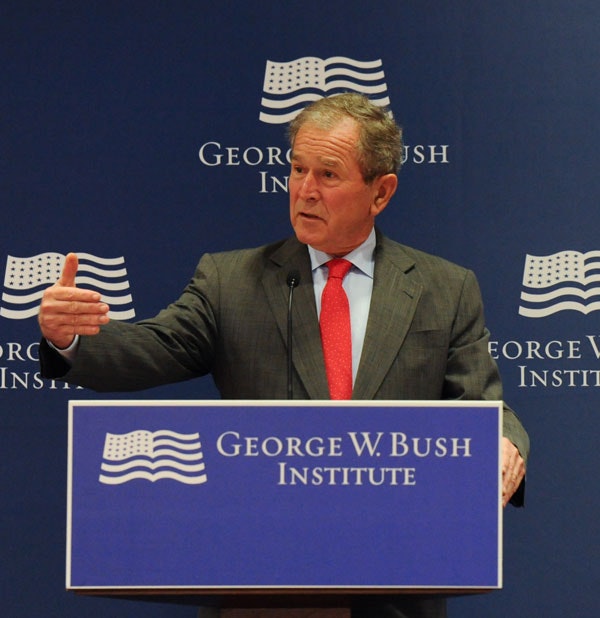 VIDEO: President Bush discusses North America at the launch of the Bush Institute's North American Competitiveness Scorecard. <a href="https://www.youtube.com/watch?v=2gPeXz9CSdA">Watch his remarks</a>
VIDEO: President Bush discusses North America at the launch of the Bush Institute's North American Competitiveness Scorecard. <a href="https://www.youtube.com/watch?v=2gPeXz9CSdA">Watch his remarks</a>
We’ve got a giant Latino population in America now, and improved relations, improved economics will make the American experience even more viable. In other words, as U.S.-Mexican relations improve, it is less likely there will become segmented parts of our population. It’ll be more like E pluribus unum.
As U.S.-Mexican relations improve, it is less likely there will become segmented parts of our population. It’ll be more like E pluribus unum.
I’m much more an expert on U.S.-Mexican relations than I am on U.S.-Canadian relations simply because I live in Texas. On the other hand, I know how important those relationships are. There’s less angst about that relationship mainly because of cultural similarities.
What’s interesting about the Canadian-U.S. relationship is it’s like, does Big Brotherism trump the relationship? And so U.S. presidents need to be very careful not to be —
— the big brother?
Yeah. I found that there’s a very interesting relationship because the Canadians know they benefit from good relations with the U.S. On the other hand, some resent the relationship, and so I tried to make sure the Canadians were partners and, to the extent that our interests are aligned on foreign policy, that they get credit for a lot of the positive things that they did.
Much of North America’s potential depends upon growing leaders, including Latino leaders here in the U.S.
No question about it. The Mexican-American voting block is significant, and it will remain significant. It’s important to lay out a philosophy about the neighborhood to give leaders, potential leaders, the opportunity to analyze what works best. Hopefully, that becomes a part of their philosophy as they seek office.
The Catalyst believes that ideas matter. We aim to stimulate debate on the most important issues of the day, featuring a range of arguments that are constructive, high-minded, and share our core values of freedom, opportunity, accountability, and compassion. To that end, we seek out ideas that may challenge us, and the authors’ views presented here are their own; The Catalyst does not endorse any particular policy, politician, or party.

